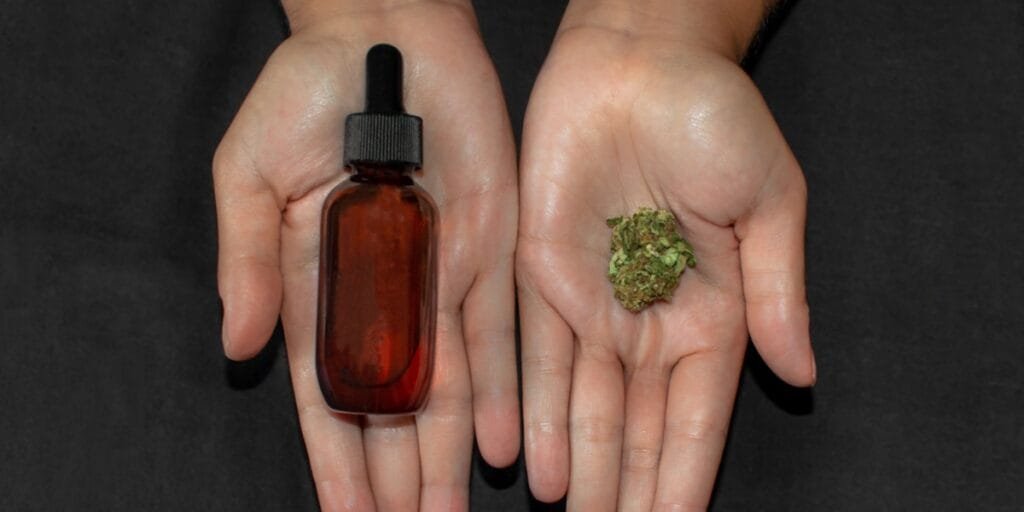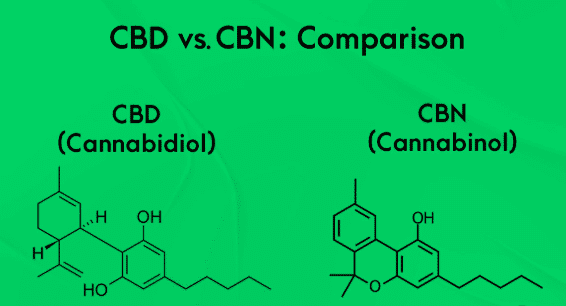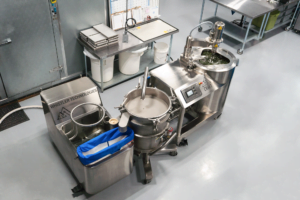THC (tetrahydrocannabinol), CBN (cannabinol), and CBD (cannabidiol) are the most discussed cannabinoids. Producers and consumers can benefit from understanding these compounds and their potential therapeutic benefits. While the two cannabinoids have similarities, there are unique properties, too.
Here, we explore the difference between CBD and CBN and go into depth about CBD vs CBN effectiveness.
Sections
ToggleWhat is CBN (Cannabinol)?

CBN, or cannabinol, is a cannabinoid that forms when THC loses its potency over time through exposure to heat, light, and oxygen. It naturally occurs in cannabis plants as it ages under the weather.
Benefits include:
1. Sleep Enhancement: CBN is renowned for its sedative properties, particularly effective for insomnia or sleep disorders management.
2. Pain Relief: Some studies have found CBN has analgesic properties that may help reduce chronic pain and inflammation.
3. Appetite Stimulation: CBN can stimulate appetite, helping individuals with eating disorders or medical conditions that suppress hunger, such as chemotherapy.
Common product forms-
1. CBN Gummies: These edible gummies are the easiest form to consume CBN. Effects of gummies typically last 4-6 hours, making them ideal for nighttime use.
2. CBN Tinctures: Sublingual tincture drops offer faster absorption and more precise dosing control for even quicker effects.
3. CBN Capsules: Capsules are in pharmaceutical-like form and are best for those seeking consistent dosing without taste considerations.
What is CBD (Cannabidiol)?

CBD, or cannabidiol, is an abundant cannabinoid found naturally in cannabis and hemp plants. However, unlike THC, CBD doesn’t produce psychoactive effects but rather offers therapeutic benefits. This is a major CBD vs CBN difference; CBD offers benefits without any risk of intoxication.
Benefits include:
1. Anxiety and Stress Relief: CBD can interact with the body’s endocannabinoid system to help regulate mood and reduce anxiety levels. It helps manage daily stress or anxiety disorders.
2. Anti-inflammatory Properties: Due to its anti-inflammatory effects, CBD can help with conditions like arthritis, inflammatory bowel disease, and other inflammatory conditions.
3. Seizure Management: CBD has proven neurological benefits, which is why it is used in FDA-approved Epidiolex, designed to treat certain types of epilepsy.
Common product forms-
1. CBD Oil: The most popular form of CBD, its oil offers dosing flexibility and can be taken sublingually or added to food and beverages.
2. CBD Topicals: Several creams, balms, and lotions are infused with CBD for localized relief of skin conditions, muscle soreness, and joint pain.
3. CBD Edibles: From gummies to chocolates, CBD can be easily put into edibles for discreet and long-lasting effects.
CBN vs CBD: Key Differences
Feature | CBD (Cannabidiol) | CBN (Cannabinol) |
Source | Directly extracted from cannabis/hemp plants | Formed from THC degradation over time |
Psychoactive | Non-psychoactive | Mildly psychoactive in large doses |
Primary Use | Anxiety, inflammation, general wellness | Sleep enhancement, sedation, appetite enhancement |
Research Status | Extensively studied with FDA approval | Limited research, still not as extensively explored |
Market Price | More affordable | Typically, more expensive due to complex extraction |
Legal Status | Federally legal (hemp-derived) | Legal status varies by state and source |
How Are CBN and CBD Similar?

When discussing the differences between CBD and CBN, it is also essential to understand their similarities. Here are the similarities between CBN and CBD:
- These cannabinoids can interact with the body’s endocannabinoid system to provide therapeutic benefits.
- CBN and CBD are non-intoxicating compounds that can help manage pain and inflammation naturally.
- When combined with other cannabis compounds, these cannabinoids demonstrate the entourage effect.
- Both cannabinoid forms undergo similar purification processes, ensuring product quality and consistency.
- CBN and CBD products are available in similar formats, from oils to edibles.
Can You Mix CBD and CBN?
Yes, even mixing CBD and CBN is a common practice for enhanced therapeutic effects. Many users combine these cannabinoids for a synergistic relationship that amplifies their individual benefits. For sleep support, their combination is particularly effective. CBD’s anxiety-reducing properties complement CBN’s sedative effects, significantly improving sleep quality.
Side Effects and Risks
Any abuse can result in side effects.
CBD Side Effects:
- Drowsiness: CBD may cause fatigue or drowsiness in high concentration or if combined with other sedating substances.
- Digestive Issues: Nausea, diarrhea, or changes in appetite are some common side effects sensitive individuals can experience.
- Drug Interactions: CBD may affect how certain medications are metabolized, potentially altering their effectiveness or increasing side effects.
CBN Side Effects:
- Excessive Sedation: CBN can have potent sleep-inducing properties; higher doses may cause grogginess or difficulty waking.
- Dizziness: First-time users can feel lightheaded or dizzy.
- Dry Mouth: CBN can reduce saliva production like other cannabinoids, leading to cottonmouth or increased thirst.
Conclusion
The CBN vs CBD debate has no ultimate winner, and it comes down to individual needs and desired outcomes. CBD is excellent for therapeutic applications supported by extensive research, while CBN provides specialized benefits, particularly for sleep and sedation.
Consumers should understand the difference between CBD and CBN to make informed decisions about which cannabinoid—or combination—best suits their wellness goals. Whether you choose CBD or CBN, always consult a healthcare professional and start with lower doses for a safe and practical experience.
FAQs
1. Is CBN legal like CBD?
Yes, CBN is legal in many places where CBD is legal, especially if it’s derived from hemp and contains less than 0.3% THC. However, laws vary by country and state, so always check local regulations before purchasing.
2. Why is CBN more expensive?
CBN is more expensive because it’s produced in smaller quantities. It forms as THC ages, making it harder and more time-consuming to extract, which increases production costs.
3. Which helps more with sleep—CBN or CBD?
CBN is often associated more with sedative effects and is commonly used for sleep support. CBD can help relax the body and reduce anxiety, which may also aid sleep, but CBN is typically considered more effective for sleep-specific concerns.
4. Can I take them together?
Yes, taking CBN and CBD together is common and may enhance their benefits due to the “entourage effect,” where cannabinoids work better in combination. Always start with low doses to see how your body responds.
5. Will either show up on a drug test?
Most standard drug tests look for THC, not CBD or CBN. However, some CBN products may contain trace amounts of THC, which could result in a positive test. Always choose lab-tested, THC-free products if you’re concerned.




